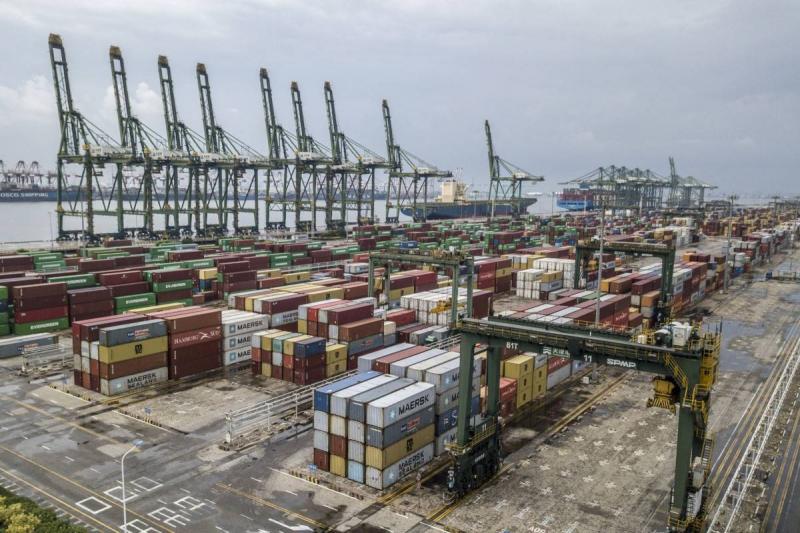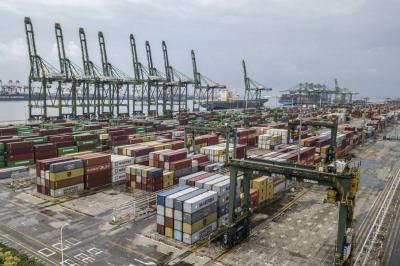China's economy finds itself besieged from all sides, grappling with a real estate slump, an energy crisis, weak consumer confidence, and rising raw material costs. The severity of the situation is expected to be revealed in government data to be released tomorrow, Monday. According to the National Bureau of Statistics, China's GDP grew by 4.9% in the third quarter, compared to growth rates of 18.3% and 7.9% in the first and second quarters of this year, respectively. Economists surveyed by Bloomberg had predicted a slowdown in GDP growth from 7.9% in the second quarter to 5% in the third, alongside weak monthly figures for investment and industrial production in September. Retail sales may rebound following successful containment of the pandemic.
Expectations for the growth of the world's second-largest economy have dimmed in recent months as the real estate market has deteriorated and a sudden shortage of electricity forced factories to reduce production or shut down entirely. Economists have steadily downgraded their forecasts for China's economic growth this year, with some, like Nomura Holdings, forecasting a potential decline to 7.7% due to the ramifications faced by the rest of the world.
### Prioritizing Long-term Reform Goals
Liu Peiqian, a Chinese economist at Natwest Markets in Singapore, said, "The outlook for growth in the third quarter is not optimistic, especially as the impact of the low base is fading. The authorities prioritized long-term reform goals in the third quarter and focused less on short-term growth targets." Here are some key issues to monitor in the data expected to be released on Monday at 10 a.m. local time:
### Real Estate Slump
Beijing has steadily tightened restrictions on the real estate market in an effort to mitigate financial risks, which has caused a slowdown in construction activity and worsened the liquidity crisis of the developer China Evergrande Group, extending the impact across the industry as a whole. The combined sales of the 100 largest property developers in China fell 36% year-on-year in September, which is typically peak home-selling season. This is likely to have a negative impact on the broader economy, as Goldman Sachs estimates that the real estate sector and related industries account for about a quarter of the GDP.
### Decline in Real Estate Investment
Given the pressures on cash flows, new investments from property development companies are unlikely to emerge. The growth rate of real estate investment may have decreased to 9.5% in the nine months leading up to September compared to the previous year, down from 10.9% in August, according to economists surveyed by Bloomberg. Zhang Shu and David Qu, economists at Bloomberg Economics, stated that Chinese GDP data will likely confirm a sharp economic slowdown in the third quarter, as the economy faces damage from multiple shocks, ranging from the Delta variant outbreak to acute energy shortages and tightened regulatory oversight. They added that the activity data for September is expected to show an even greater slowdown in industrial production growth, though consumer growth is stabilizing, albeit at a low level.
### Energy Crisis
The electricity shortage forced Chinese factories to suspend production during the second half of September, causing the Purchasing Managers' Index to drop below 50 for the first time since the pandemic began last year. This decline reflects diminished activity in China's manufacturing sector. However, strong export data and increased electricity consumption last month suggest that the impact of the energy crisis on industrial production may be more varied. Economists at Goldman Sachs, led by Maggie Wei, noted in a memo that electricity consumption in the secondary sector recorded an annual increase of 6%, indicating strong industrial activity despite power outages. They stated that energy consumption data may be volatile and could deviate from industrial production trends based on previous results.
### Consumer Caution
After the Delta variant cases began spreading in mid-July, China had to deal with its most widespread COVID-19 outbreak since it first emerged in late 2019. Authorities managed to control the outbreak again by the end of September, but the country's strict zero-tolerance strategy affected consumption.
### Easing COVID-19 Restrictions
Local governments began to ease controls imposed to manage the pandemic since late August, which may have contributed to the improvement in retail sales in September. Activity in the services sector rebounded stronger than expected during the same month, according to official Purchasing Managers' Index surveys. Retail sales growth may likely accelerate to 3.5% in September from 2.5% in August, according to economists surveyed by Bloomberg.
### Export Boom
The sudden rise in China's export growth rate during September was one of the few major economic highlights amid a flood of bad news. Demand for Chinese goods remained strong in advanced economies, partly because buyers shifted orders from other emerging economies, such as Vietnam, which struggled with the Delta variant outbreak. Many buyers are also trying to place their Christmas orders to overcome global supply chain issues. The increasing trade surplus is one of the contributing factors to the sustained strengthening of the Chinese yuan this year, even amid deteriorating economic growth prospects. These gains may be starting to raise concerns among policymakers; the People's Bank of China pegged the yuan at a weaker than expected value on Thursday, causing the currency to decline from its four-month high.




